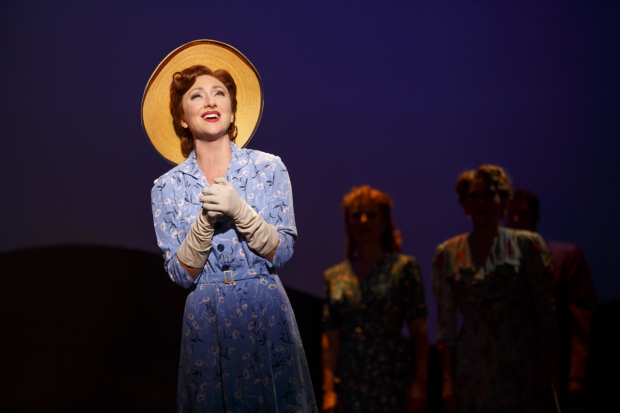
(© Joan Marcus)
Bright Star is a brilliant new musical that has barreled into the Kennedy Center for a limited engagement before moving to Broadway. With music and book by Steve Martin and music and lyrics by Edie Brickell, Bright Star is a story of two loves that plays with images of darkness and light, and with the audience's emotions, making it pensive one moment, joyous the next.
The musical is set the American South in the 1920s and 1940s. Inspired by a true situation, it tells the story of a successful literary editor, Alice Murphy, who meets a young soldier, Billy Cane, recently returned from World War II. Billy is determined to be a writer. He seeks out Miss Murphy and her prestigious Asheville Southern Journal, giving her stories he wants to have published.
In the process of getting to know Billy, Alice is forced to reflect on her past and confront a secret that she has buried since she and Jimmy Ray Dobbs knew one another as sweethearts when they were young.
Carmen Cusack is delightful as Alice, a wild backwoods girl growing up in Zebulon and later, Asheville. When she belts her first song, "If You Knew My Story," an energetic bluegrass tune that she liberally peppers with vocal ornamentation, it becomes immediately clear why Cusack was chosen to star in this show. Paul Alexander Nolan brings a passionate stage presence to his character of Jimmy Ray. He has a fine voice that fits the music perfectly.
A.J. Shively is excellent as Billy Cane. He perfectly transmits the passionate soul of a would-be writer, bursting with stories that he wants to get down on paper. He has a particularly fine moment when he sings "She's Gone," about his mother, remembering how she encouraged him to write. His sweetheart, Margo (Hannah Elless), waits patiently for him to return to her, singing one of the show's loveliest numbers, "Asheville." Stephen Lee Anderson is well cast as Daddy Murphy, as is Michael Mulheren as the blustering Mayor Dobbs. Emily Padgett is entertaining as Lucy Grant.
Martin's book smoothly shifts the story from tragedy to comedy, deemphasizing Alice's agony and moving in a different direction when the story threatens to become too melodramatic. The only possible criticism of Bright Star's plot might be that it is too busy, full of flashbacks and personality alterations. However, director Walter Bobbie keeps the time periods clear and the characters' situations obvious. Martin and Brickell collaborated beautifully on the music. Brickell's lyrics are intelligent and classic; she never bends the meaning of her lines to get a rhyme. The score is amazingly versatile, complete with bluegrass, ballads, pseudo-rock, jazz, and gospel sounds. There is a marvelous balance among the instruments, including cello, mandolin, violin, banjo, and accordion, among others, all under the music direction of Rob Berman.
Eugene Lee's clever stage design features several set pieces, the largest of which is Billy's backwoods home. Some of the musical's 10 musicians sit inside the house, which moves conveniently to the side of the stage when the action takes place in Alice's office. The rest are seated on a balcony stage right. Jane Greenwood's costumes accurately reflect the fashions of 1923 and 1945-46 while Josh Rhodes' fluid choreography helps to make the many — at times nearly 20 — bodies onstage seem like a community and not simply actors playing roles. The musical comes across almost as an opera, with more music than speaking. Some songs serve to move the action along, while others stand alone as magnificent arias, allowing characters to display their emotions through song. Every element of this production contributes to a final impression of imagination burnished by grace and humor. Every moment feels original and authentic. Bright Star creates a community where love is valued above any other emotion, and where the best way to express that emotion is through music and song.








